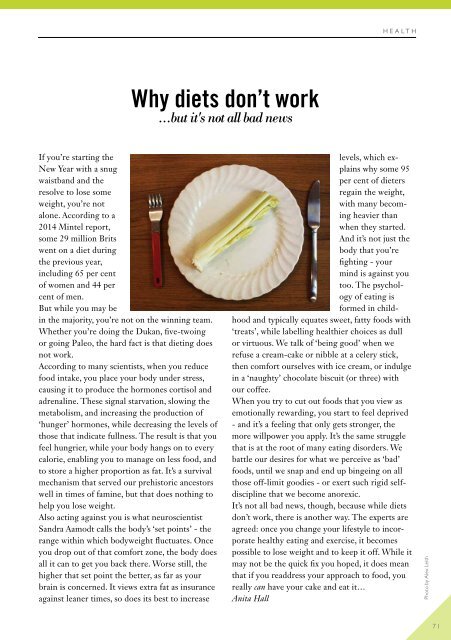Create successful ePaper yourself
Turn your PDF publications into a flip-book with our unique Google optimized e-Paper software.
HEALTH<br />
Why diets don’t work<br />
...but it's not all bad news<br />
If you’re starting the<br />
New Year with a snug<br />
waistband and the<br />
resolve to lose some<br />
weight, you’re not<br />
alone. According to a<br />
2014 Mintel report,<br />
some 29 million Brits<br />
went on a diet during<br />
the previous year,<br />
including 65 per cent<br />
of women and 44 per<br />
cent of men.<br />
But while you may be<br />
in the majority, you’re not on the winning team.<br />
Whether you’re doing the Dukan, five-twoing<br />
or going Paleo, the hard fact is that dieting does<br />
not work.<br />
According to many scientists, when you reduce<br />
food intake, you place your body under stress,<br />
causing it to produce the hormones cortisol and<br />
adrenaline. These signal starvation, slowing the<br />
metabolism, and increasing the production of<br />
‘hunger’ hormones, while decreasing the levels of<br />
those that indicate fullness. The result is that you<br />
feel hungrier, while your body hangs on to every<br />
calorie, enabling you to manage on less food, and<br />
to store a higher proportion as fat. It’s a survival<br />
mechanism that served our prehistoric ancestors<br />
well in times of famine, but that does nothing to<br />
help you lose weight.<br />
Also acting against you is what neuroscientist<br />
Sandra Aamodt calls the body’s ‘set points’ - the<br />
range within which bodyweight fluctuates. Once<br />
you drop out of that comfort zone, the body does<br />
all it can to get you back there. Worse still, the<br />
higher that set point the better, as far as your<br />
brain is concerned. It views extra fat as insurance<br />
against leaner times, so does its best to increase<br />
levels, which explains<br />
why some 95<br />
per cent of dieters<br />
regain the weight,<br />
with many becoming<br />
heavier than<br />
when they started.<br />
And it’s not just the<br />
body that you’re<br />
fighting - your<br />
mind is against you<br />
too. The psychology<br />
of eating is<br />
formed in childhood<br />
and typically equates sweet, fatty foods with<br />
‘treats’, while labelling healthier choices as dull<br />
or virtuous. We talk of ‘being good’ when we<br />
refuse a cream-cake or nibble at a celery stick,<br />
then comfort ourselves with ice cream, or indulge<br />
in a ‘naughty’ chocolate biscuit (or three) with<br />
our coffee.<br />
When you try to cut out foods that you view as<br />
emotionally rewarding, you start to feel deprived<br />
- and it’s a feeling that only gets stronger, the<br />
more willpower you apply. It’s the same struggle<br />
that is at the root of many eating disorders. We<br />
battle our desires for what we perceive as ‘bad’<br />
foods, until we snap and end up bingeing on all<br />
those off-limit goodies - or exert such rigid selfdiscipline<br />
that we become anorexic.<br />
It’s not all bad news, though, because while diets<br />
don’t work, there is another way. The experts are<br />
agreed: once you change your lifestyle to incorporate<br />
healthy eating and exercise, it becomes<br />
possible to lose weight and to keep it off. While it<br />
may not be the quick fix you hoped, it does mean<br />
that if you readdress your approach to food, you<br />
really can have your cake and eat it…<br />
Anita Hall<br />
Photo by Alex Leith<br />
71


















